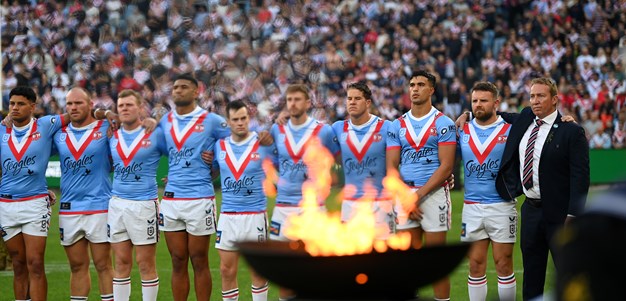Players who deliberately concede a penalty in a bid to stop the match and try to overturn a referee’s decision risk being sent to the sin-bin without being allowed to use the captain’s challenge.
NRL head of football Graham Annesley described the tactic as “cynical” and said South Sydney hooker Damien Cook could have been sinbinned in last Friday night’s 26-12 loss to Penrith after being penalised for slowing the play the ball so he could ask the bunker to review a Panthers’ knock-on.
Broncos hooker Jake Turpin was not so fortunate after referee Chris Sutton marched him for deliberately holding down Warriors centre Jesse Arthars and shouting “captain’s challenge” as soon as the penalty was awarded.
On both occasions the referee had called play-on, but the defending team believed there had been a knock on by their opponent and wanted to use a captain’s challenge.

However, a captain’s challenge can only be used if the referee rules a knock-on and the team which loses possession believes the call was incorrect.
“A team can’t try to create a stoppage in order to challenge something that has previously been missed,” Annesley said. “If there is a natural stoppage, then they can challenge the reason the referee caused the game to stop.
“Some people will say it doesn’t matter as long as we get the right decision in the end but there has to be some parameters, otherwise we would have stoppages to play all the time.
“Once they think they get a decision changed, they would just be coached to give away a penalty so they can go back and challenge the original decision.”
Cameron Munster used the ploy in a pre-season trial after ‘flopping’ on a tackled player until penalised so he could challenge a knock-on and referee Ashley Klein warned the Storm five-eighth that if he was unsuccessful he would be sent to the sin bin.
Cameron Munster's illegal captain's challenge
Annesley suggested that Munster should have been sent to the sin bin regardless, along with Cook in last Friday night’s grand final re-match.
“This was the incorrect decision by the referee,” Annesley said. “The referee has ruled play-on. They can’t challenge whether Souths have knocked the ball on or knocked the ball back because the game is continuing, but what Damien does is just stays on the ball carrier and he ultimately concedes a penalty.
“When the referee blows the penalty, they say they want to challenge whether it was a knock-on. That is not a legitimate challenge because the referee made a play-on decision that can’t be challenged.
“There have been other incidents and it becomes quite a cynical stoppage, as well. It is not just a player pushing the rules to the limits; they are doing it for a particular reason, which is try and get a challenge approved when they are not entitled to one.”

He warned players using the tactic risked the same fate as Turpin and would jeopardise their team’s chances of winning if they were sin-binned for a professional foul.
“By rolling the dice hoping to have a decision overturned the Broncos lost a player to the sin bin for 10 minutes so it is a high-risk strategy just to try and get a decision reviewed,” Annesley said. “The referee didn’t allow the challenge because it wasn’t a challengeable decision. That is the correct way to handle it.”
Annesley said he had spoken with referees boss Jared Maxwell to ensure there was greater clarity and more consistency among match officials about handling such incidents.
He also said Klein had done a good job of controlling a tense but high quality match between the Panthers and Rabbitohs.


